Latino voters can’t be ignored. L.A. mayoral candidates are working to earn their votes
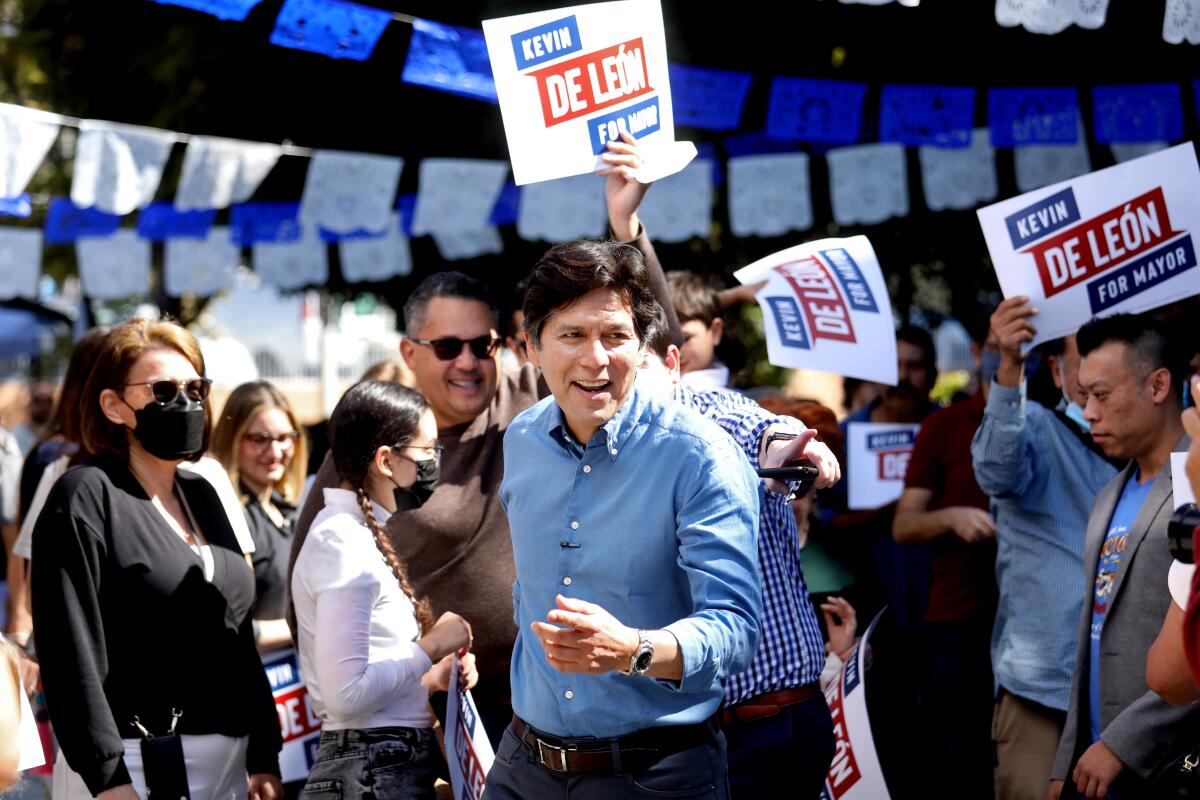
- Share via
When Antonio Villaraigosa ran for mayor of Los Angeles in the early 2000s, some were not ready for a Latino to lead the city.
Despite facing racism on the campaign trail, the third-generation Mexican American leaned into his identity, learning Spanish and holding bilingual news conferences. He won partly on the strength of the Latino voters he brought to the polls.
Since then, Latinos, who are nearly half the population and a third of the electorate in L.A., have matured as a political force.
In his campaign for mayor, City Councilman Kevin de León is emphasizing his bona fides as a fluent Spanish speaker and the son of a single mother from Guatemala who worked as a housekeeper.
Latino voters are a huge asset that other candidates are also making a play for, hiring Latino staffers, expanding their bilingual marketing and, in some cases, attempting to connect with voters in Spanish as they gear up for the June 7 primary.
With about 40% of voters undecided, U.S. Rep. Karen Bass (D-Los Angeles) holds a small lead, and De León is a close second, according to a recent poll by the Loyola Marymount University Center for the Study of Los Angeles.
Latino voters, in particular, tend to make up their minds later, taking their time to assess each candidate’s pitch before making their choice, said Matt Barreto, a politics and Chicano/a studies professor at UCLA.
Although many Latinos have a preference for Latino candidates, their support is not guaranteed. As the only major Latino candidate, De León can’t take his natural advantage for granted, Barreto said.
Bass, with her long history of activism in South L.A., has secured several key endorsements from Latino leaders, including that of Villaraigosa.
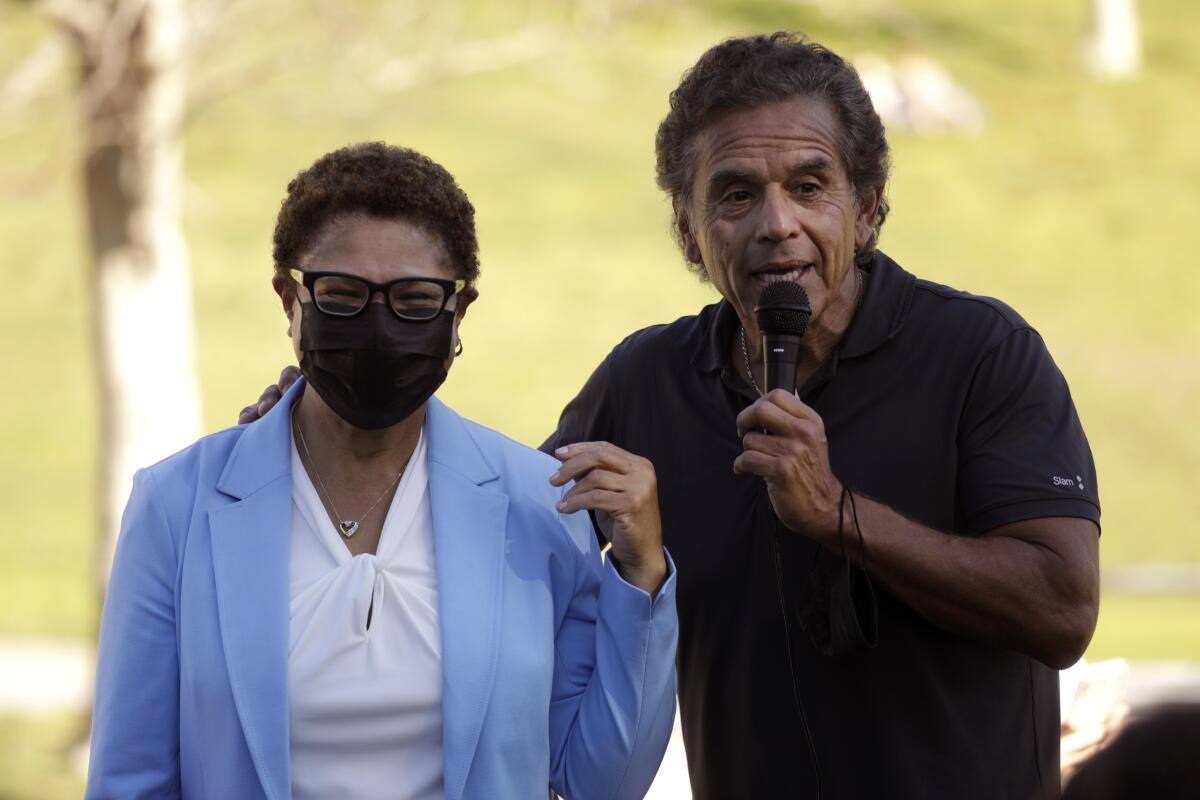
“The 2001 and 2005 mayoral elections were the first ones where we saw Latino engagement at that high of a level,” Barreto said. “And today, it’s much, much more engaged. Latinos do turn out to vote at high rates and they can be consequential in deciding elections. But just like everyone else, that only happens when the investment is made.”
The Latino electorate contains the most new voters of any group, Barreto said, skewing younger and with a chunk of newly naturalized citizens.
That means candidates need to take more time to carefully explain policy platforms, Barreto said.
Like the other candidates, De León needs to “go door to door. He has to go to Latino community events and make connections with the voters,” Barreto said.
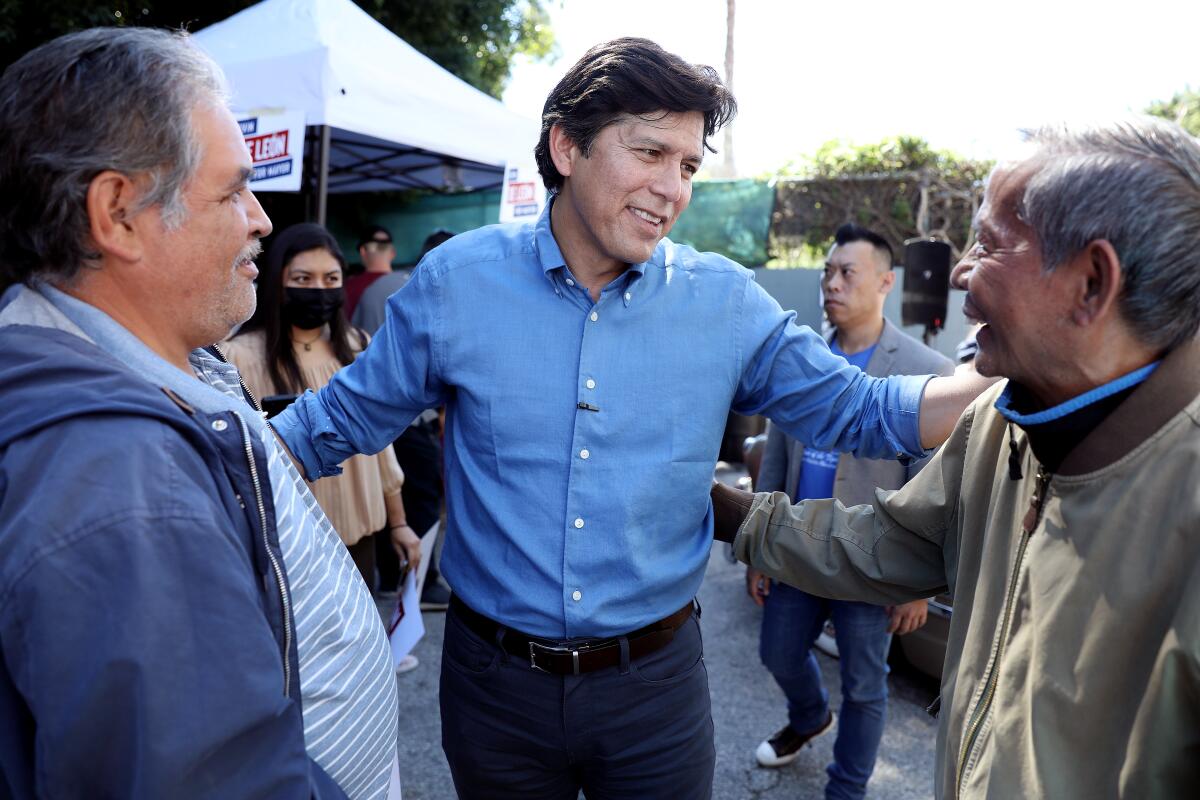
Top issues for Latino residents in L.A. County are the pandemic, homelessness and the economy, according to a survey commissioned by the Pat Brown Institute at Cal State Los Angeles and the California Community Foundation.
Immigration reform is an important issue for many Latinos, but it doesn’t rank among the top five in the survey.
Many Latinos identify as Democrats but consider themselves moderate, not necessarily liberal. They worry about crime and discrimination against Latinos, and many aren’t on board with defunding the police, according to the survey.
“Candidates shouldn’t be making any assumptions about Latino voters. They should get to know them,” said Barreto, who worked on the survey. “People from outside of our community often make assumptions.”
The major candidates for mayor are paying attention to Latino voters, who are the largest ethnic group in L.A. at 48% of the population. The city is about 29% white, 12% Asian and 9% Black.
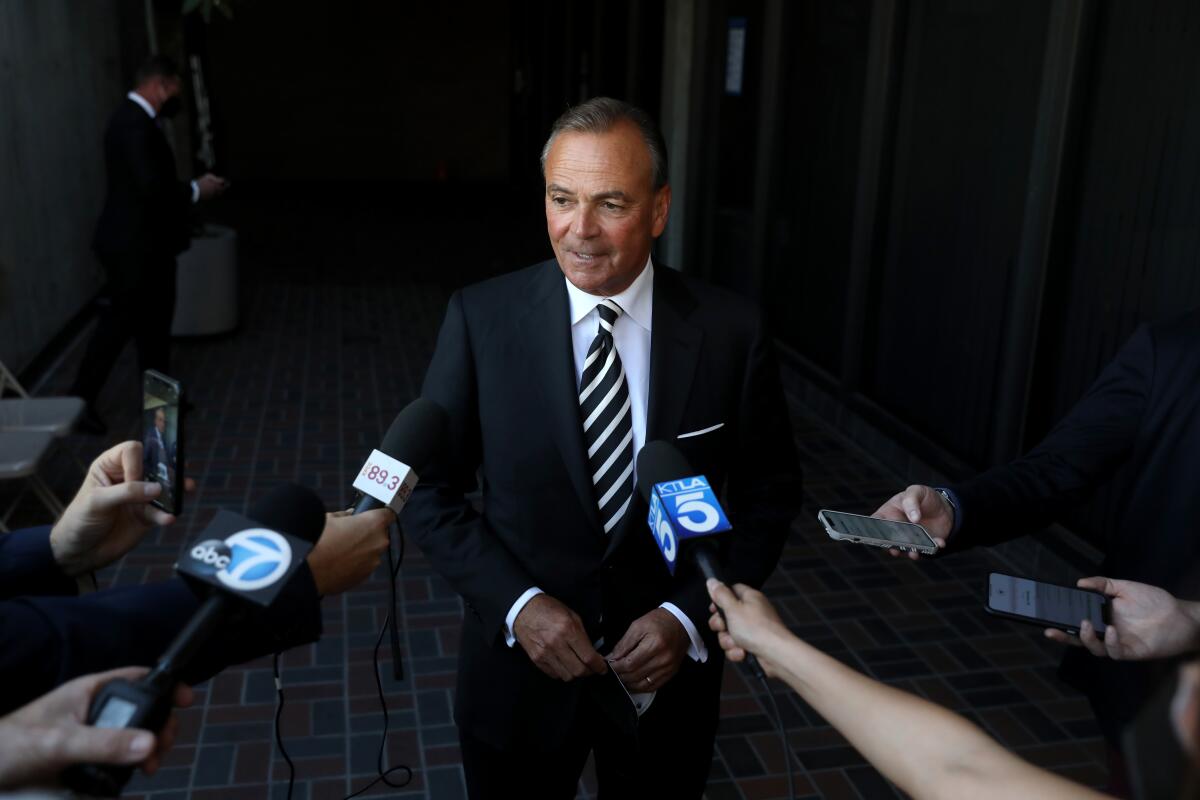
Political consultant Juan Rodriguez, who is working on billionaire developer Rick Caruso’s campaign, is focusing on bilingual digital and broadcast messaging, including platforms like YouTube.
Caruso’s staff has conducted independent research about the needs of the Latino community. Spanish-language ads introducing the candidate, who does not speak Spanish, began appearing on Telemundo weeks ago.
Bass’ team highlights her work with the Community Coalition, a Black-Latino organization she founded in South L.A. decades ago.
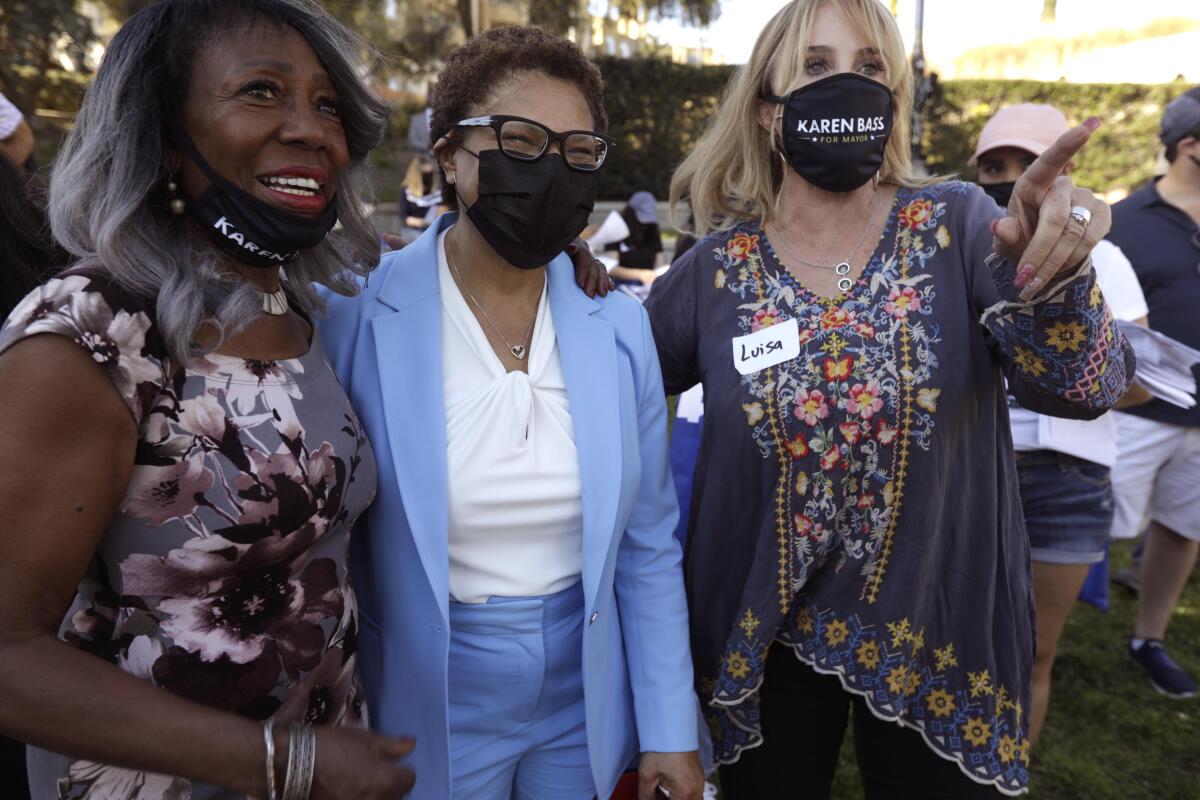
“What people are looking for in L.A. goes beyond race or gender,” said Bass’ spokesperson, Anna Bahr. “The hunger people have right now is for a leader who will address the challenges their families are facing every single day, like education, public safety and the impact of the pandemic.”
Bass has secured endorsements from major Latino leaders, including Villaraigosa, labor activist Dolores Huerta and California state Assembly Speaker Anthony Rendon.
Huerta said Bass has a long history of working on Latino issues.
“Having this notion that only Latinos can represent Latinos is racist,” Huerta said.
Villaraigosa said he also believes that the city has transcended racial politics.
“I’ve known and worked with Karen Bass for 50 years,” he said. “This is a woman who has the courage of her convictions and has worked as a community organizer virtually her entire life.”
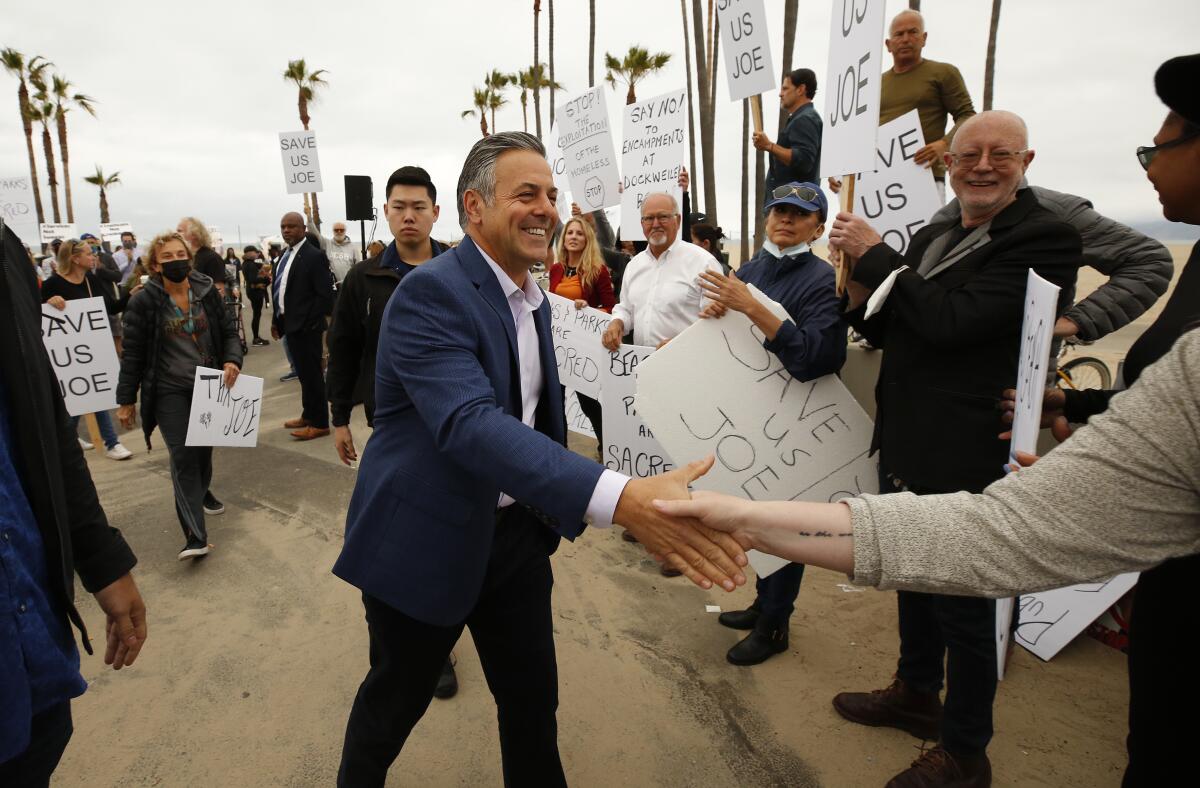
City Councilman Joe Buscaino is making appearances on Spanish television, mostly speaking English but trying to answer in Spanish when he can.
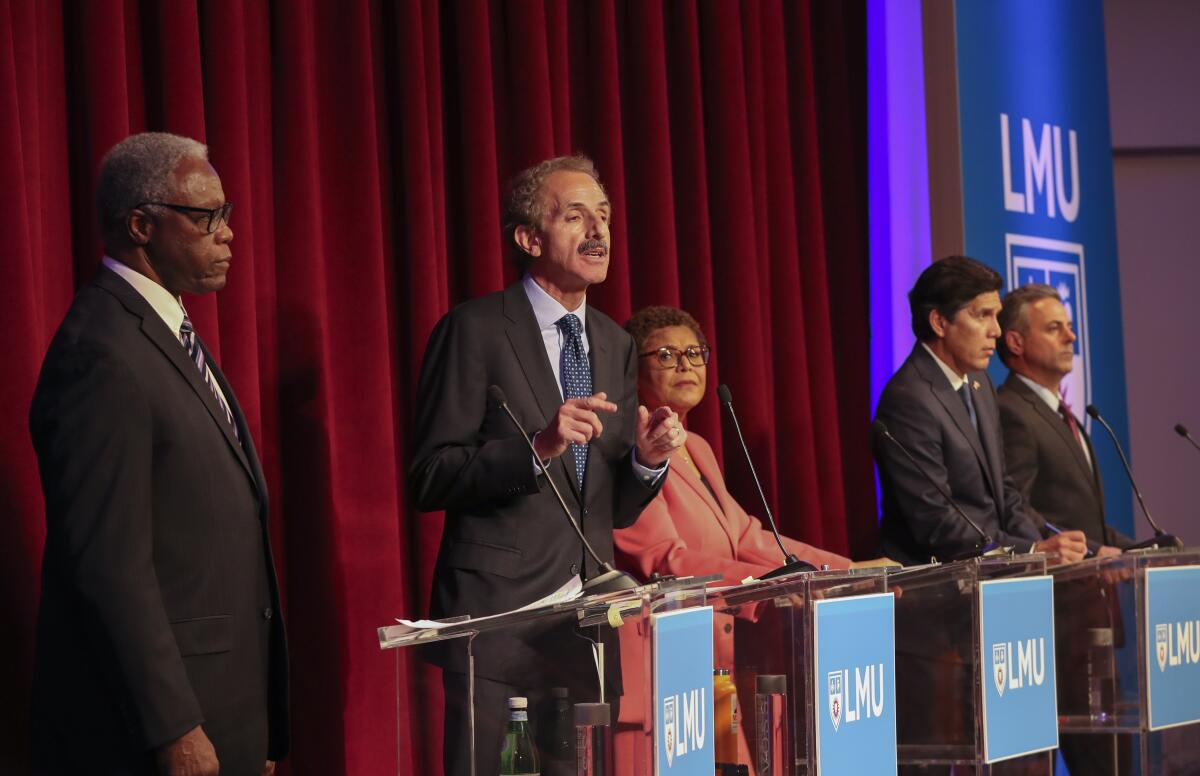
City Atty. Mike Feuer has set a goal of visiting every L.A. neighborhood, appearing in a different park every weekend to shake hands with voters. For years, he has given news conferences, switching between English and passable Spanish.
De León served in the state Assembly and state Senate, including four years as the Senate’s president, before joining the City Council in 2020.
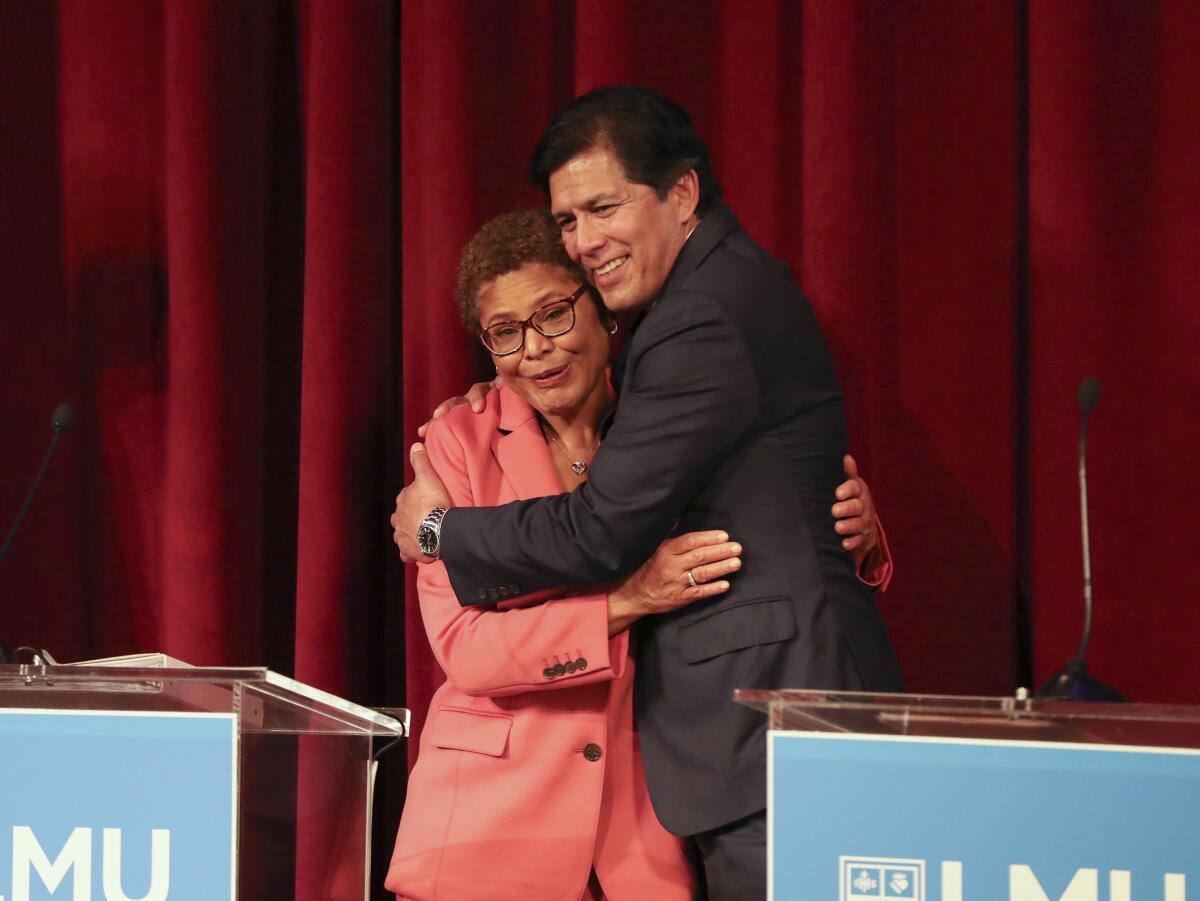
He said his background inspires him to tackle homelessness and economic insecurity, especially for those who continue to struggle during the pandemic.
“Angelenos deserve a mayor who understands what they’re going through each day and someone who will act with a sense of urgency to address those challenges,” De León said. “I know what it feels like to live in the margins.”
Latinos “quieren hechos, no dichos,” he added — they want results, not promises.
The majority of De León’s staff is Latino, and he speaks regularly to Spanish and English media, with the understanding that Latino voters get information from a variety of sources, said Courtni Pugh, his general counsel.
But he has a lot of work to do, both in spreading his message beyond the neighborhoods he represents as a councilman and in counteracting stereotypes about Latino politicians, experts said.
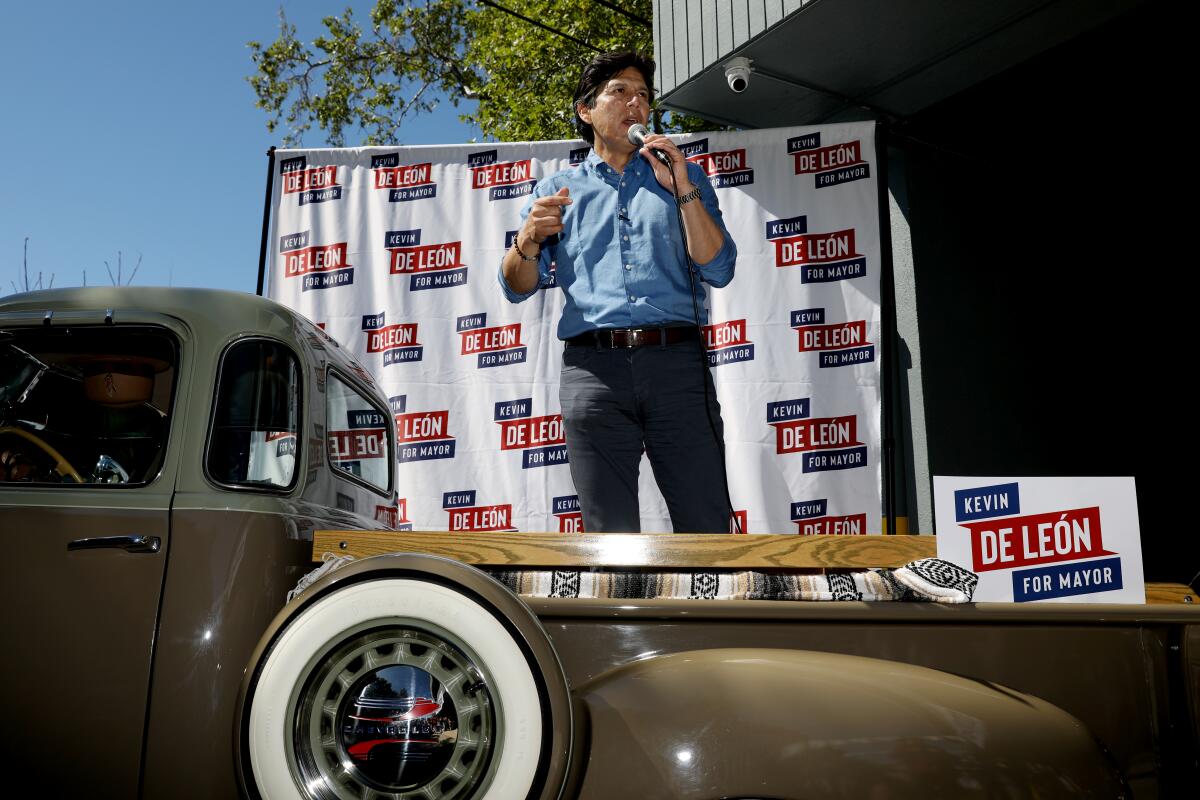
With more Latinos serving in offices from city council to U.S. Senate, the idea of a Latino mayor is more familiar than it was in Villaraigosa’s day, which may help De León, said Fernando Guerra, a politics and Chicano/a studies professor at Loyola Marymount University.
Though his background is an asset with Latino voters, he still must sell himself as a mayor who represents all Angelenos.
“There are still many who believe that electing a Latino means that person will only be focused on the Latino community to the detriment of other communities,” Guerra said. “By defining him as a Latino candidate, they define him as narrow and incapable of pursuing broader significant policy.”
In Boyle Heights, which De León represents on the City Council, some Latino voters said they did not know him personally and were not sure whether they would support him.
Julia Martinez, a special education teacher, said she would prefer a Latino leader. But more than anything, she said, she wants to see changes in her neighborhood.
The homelessness crisis has affected her street in Boyle Heights, making her feel less safe leaving the house with her son, she said.
She said she’s leaning toward voting for Bass but doesn’t know enough about the candidates to make a decision yet.
“They’re in front of homes constantly, and it’s sad,” Martinez said about homeless people. “You can’t walk around the neighborhood anymore. It’s dangerous.”
Another Boyle Heights resident, Patricia Martinez-Watson, said cleanliness and safety are the top issues she wants the next mayor to address.
“As a retired person, I want to be able to walk to the park,” she said. “I don’t have the solution, but I just know I feel violated when people decide to put a tent right in front of my house.”
Martinez-Watson was born in the U.S., but she is concerned for immigrants and wants the mayor to help them gain citizenship.
She said she doesn’t know a lot about the candidates but has heard good things from her neighbors about De León.
She credits him with cleaning up homeless encampments, making it easier for her to walk down Cesar Chavez Avenue and 1st Street.
But he hasn’t earned her vote yet — she remains undecided.
More to Read
Sign up for Essential California
The most important California stories and recommendations in your inbox every morning.
You may occasionally receive promotional content from the Los Angeles Times.















